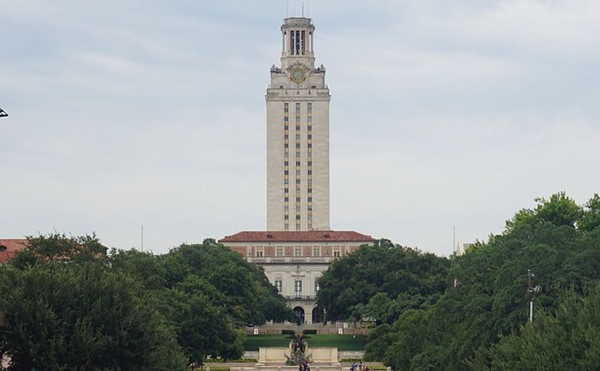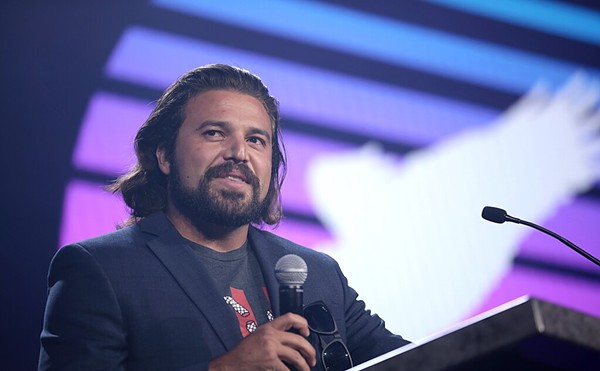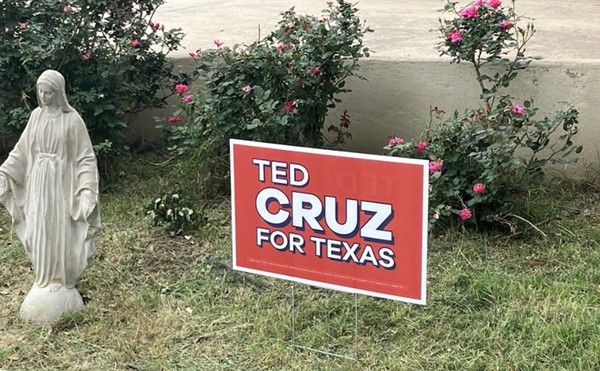On April 12 this spring, a young, idealistic double agent resigned his mission.
“I worked very hard for the `Texas Green Party` because I believe in the GPTX and its core values and mission,” he wrote. “I worked so very hard because Texas is in a political crisis. We are in desperate need of courageous, ethical leaders that the GPTX offers.”
Called to account for his dubious service in an Austin courtroom in late June, Garret Mize told the judge he suspected that his assignment might lead to legal trouble. And so it did. Based in large part on his testimony, the court issued an injunction barring the Texas Green Party from submitting its statewide candidates for the ballot and scheduled a trial for January 2011. Eight days later, the Texas Supreme Court stayed the injunction, allowing the Party to submit the names of four candidates selected at its June 12 San Antonio convention. But the story was already making national headlines, thanks to a June 6 exposé by Dallas Morning News reporter Wayne Slater, who reported that the Greens’ successful bid to get its top-of-the-slate candidates before Texas voters for the first time in eight years was financed by Republican operatives whose goal is to siphon just enough votes from former Houston Mayor Bill White to guarantee Governor Rick Perry’s survival.
On June 9, the Secretary of State reported that a random sampling of the more than 91,000 signatures submitted by the Green Party checked out, meaning that this fall the lefty faction of what’re sometimes called “fuck-you voters” can tick the electronic checkbox for Deb Shafto, Green nominee for Governor of Texas.
In 2010, the year Democrats were scheduled to finally Take Back Texas, with redistricting on the horizon, in a state where Governor Good Hair’s rule has been perpetuated by a simple plurality — he extended his elected term into the double digits in 2006 with just 38 percent of the vote — it was alarming news.
And according to the Texas Democratic Party, illegal.
Mize failed to deliver the deal, but Perry-linked Republican strategists provided funding through a Missouri not-for-profit that paid for the ballot-access petitions and delivered them to the Greens as an in-kind donation. Although the Greens knew as early as last December that there might be money available from sources whose motives were anti-Democratic Party, the Greens’ leaders have produced a paper trail showing that they didn’t realize the money was coming through a corporation, and there is no hard proof yet that they knew that the donor(s) or middlemen might be linked directly to the Governor.
More importantly, as the immediate gain has become clear, they’ve begun aggressively defending their right to game a system that’s stacked against them. Pulling the petitions or withdrawing their candidates — which the Green Party’s attorneys have advised them they cannot legally do in any event — would disenfranchise the voters and the candidates, who have done nothing wrong, says Green Party State Coordinator Kat Swift (a Current employee from 2002-2006).
“They want to talk about how Republicans gave us money, but Republicans give Democrats money all the time,” Swift said. “The reason we don’t take corporate money is because we don’t want corporations to be in politics at all. … It would be interesting to see how the Democratic and Republican parties could function without all the corporate money they take.”
Mize’s paychecks, $2,000 per month plus expenses, were signed by Mike Toomey of the Texas Lobby Group, a former Republican state rep and Rick Perry’s chief of staff from 2002-’04. Mize, a 22-year-old University of Texas-Austin vegan who interned with the Texas Freedom Network (where he is now employed) and demonstrated against the recent controversial State Board of Education curriculum changes, testified that he was introduced to Toomey in November 2009 by the boyfriend of his girlfriend’s sister — Stuart Moss, an Austin lobbyist with Bearse & Co., whose name partner authored Perry’s speeches for eight years. Mize’s mission: convince the Greens to accept money of mysterious origin for their ballot-access drive and make sure they had a gubernatorial candidate.
They eventually settled on a strategy that combined the promise of alternative-energy money from the windpower industry and individuals who might like to see the Dems lose in the fall. (The windpower idea was so tantalizing that Greens Treasurer David Wager pushed for the development of a major funding campaign based on appealing to the alternative-energy sector.)
“I am unclear about the line between what I should and should not tell these people about who specifically will be funding them, who I am representing (TLG), etc.,” Mize wrote in a November 9 email to Moss. “They are very inquisitive people and they are very worried about their reputation and integrity, so the more honest I can be the better, but don’t worry — so far I have kept things pretty vague for them.”
It’s been kept pretty vague for Texas’ voters, too. Following a brief skirmish before the state’s Supreme Court — the all-Republican Supreme Court, the TDP reminds us — the Dems withdrew their effort to exclude the Greens’ candidates from the ballot, but have declined a request to drop the Green Party from the civil lawsuit. At issue in the suit, nominally anyways, is whether ballot-access drives are part of normal operating expenses for third parties, and therefore the sort of thing corporations can underwrite. It’s an important question for minor parties, and Libertarians have taken up the Greens’ cause (former Libertarian National Committee Chairman William Redpath submitted an amicus letter to the Texas Supreme Court.)
But the Greens believe the Dems’ short-term goal is to keep the story in the headlines until election day. Swift says the subpoenas and depositions so far have focused on individuals she says failed, “and failed miserably,” to raise the money for the ballot-access drive but who can be connected to Perry in campaign ads.
She names Perry-affiliated (Rick and Houston home magnate Bob) Patriot Group political consultant Anthony Holm, as one example. Holm’s name surfaced in a short email Swift sent to Green Party candidates Deb Shafto and Don Cook on March 21. “So I just got a call that a republican in texas wants to give us 40% of the cost of petitioning,” she wrote. “But I got his name! Anthony Holm(?)”
But Swift and Holm, who had never spoken to each other prior to the email, insist the tip was a red herring. “I neither donated nor sourced the funds,” Holm told the Current, echoing his statements to other media outlets. Swift said that although Holm made a few phone calls on her behalf following their initial conversation, he merely confirmed what she already suspected: any potential funding deal Mize had been working on was dead.
“I don’t think they really want to find out who gave us the money,” Swift said, but since the ongoing lawsuit allows the TDP to continue deposing witnesses, “I’m guessing they will continue to use it as a media ploy.”
Democratic advocacy groups such as the Lone Star Project have connected the many Perry-related dots, but we don’t know yet, and may never know, who actually wrote the check for the Green’s ballot-access campaign — a $534,000 value according to Take Initiative America, the Missouri-based 501©4 that funneled the money to the Free & Equal Election Foundation and then gave the signed petitions to the Greens as an in-kind gift. According to the Dallas Morning News, Tim Mooney — a longtime political operative who has most often worked for issues associated with and beneficial to Republicans and conservatives, including the recent corporate push to require secret ballots in union-representation elections — said he connected Take Initiative America with Free & Equal.
Mize testified in June that he contacted Free & Equal in January at Moss’s request, and that when he spoke with a man who was likely Free & Equal Executive Director Sean Haugh, Haugh seemed to already be familiar with his request thanks to someone named “Mike.” In Swift’s March 21 email about Holm, Swift mentions that the possible 40-percent funding would be contingent upon the Greens using the petition company she least prefers. It was Haugh who made that call to Swift. In a March 25 document emailed to Mize, Swift ranks seven firms, from most- to least-preferred, based on research and “our confidence.” Free & Equal comes in second-to-last, with a bid of $187,000 for 50,000 valid signatures (Mize recalled that Free & Equal had quoted him approximately $220,000 for 60,000 valid signatures; in the end Free & Equal delivered more than 90,000 signatures but had time to guarantee less than half of the total.)
But Mize told the court that he had never heard of Take Initiative America, its founder Charles Hurth III, or Mooney. Swift says Haugh never revealed the source of the money, and indicated that whoever it was was worried about being publicly associated with the Green Party.
“It probably does lead back to some Republican billionaire,” Swift said.
Although he claims no participation in the successful ballot drive, Holm says he supports the right of Greens, Libertarians, and other minor parties to be on the ballot.
“The basis of the Democrats’ lawsuit presumes voters belong to their party in June,” Holm said. “It presumes that five months before an election an independent voter will vote Democratic, and if the Greens are on the ballot the Democrats can civilly sue and get money from the Greens because they’re taking their voters.”
This argument rings true with Greens the Current spoke to, who believe the Democrats’ long-term plan is to undermine the Greens’ best chance in a decade to be a viable political force in Texas.
If one of the Green Party’s statewide candidates earns at least 5 percent of the vote — almost a given in the Comptroller race which has no big-D contender — the Party is automatically qualified for the 2012 statewide ballot (although the Democrats could still knock the Greens off of the ballot in two years by running a full slate of candidates, in which case they’d have to go the petition route again).
Of course, one of the Green Party’s key tenets is purging politics of corporate money, which has opened the Texas Greens to charges of hypocrisy and expediency, because the ballot-drive donation was made through a 501©4 which is not required to disclose the source of the funds.
Former Green presidential candidate David Cobb, who ran Nader’s successful all-volunteer ballot-access drive in 2000, says he’s more disturbed by the assumption that underlies those accusations than the way the ballot-access drive went down.
“This situation is exposing how the super-rich have increasingly profound control over who gets on the ballot, who participates in the debates, who is presented as a viable candidate,” Cobb said. Texas is considered one of the five “grizzly bear” states, where the ballot hurdles for minor parties and independents are discouragingly high. For instance, the Greens’ window for gathering more than 43,000 signatures from voters who were registered at least 30 days prior was March 10-May 24, and anyone who voted in the March 2 primaries was ineligible to sign the Greens’ ballot-access petition. They are essentially entitled to “leftover voters,” said Swift. Before the Free & Equal deal came to the rescue on May 10, Green volunteers were making slow progress collecting signatures at events such as Eeyore’s Birthday in Austin. Fourteen days later, they had more than 90,000 signatures ready for the Secretary of State.
“Texas has some of the most restrictive ballot-access laws in the country. Those laws are intentionally and deliberately designed to prevent voters from ever being presented with choices,” Cobb said. “I don’t think the average voter should be upset when the Greens or anyone do anything legal to get on the ballot.” Like Swift, Texas native Cobb notes that the Greens support instant-runoff voting and, having never held the statehouse, are not responsible for the persistence of the simple-plurality rule.
The Green Party candidate for Travis County Clerk withdrew following the Dallas Morning News exposé and subsequent legal fallout (he declined to speak with the Current), but other Greens are energized by their outlaw reputation.
“I seem to be on the ballot, and we weren’t before,” said Don Cook, a retired probation officer and Green Party candidate for Harris County Clerk. “From the Green Party standpoint, that’s a positive thing.” Cook says he didn’t learn Mize, whom he describes as “clean-cut, look-you-in-the-eye,” had operated as a double agent until the June 24 court hearing. He communicated frequently with Mize about his fundraising efforts, and although Cook says he and other Greens would joke about Mize being a Perry mole, “it was beyond belief that Perry would ever try to do something like this.”
For Cook, the ballot-access flap has been educational. “What we fell for was the green-energy ploy,” he said, but their repeated insistence to Mize and others that they could not take any corporate money may have been too narrow for “this system that isn’t a democracy.”
“There may have been some things we said glibly before, that we’re thinking about now,” Cook said. “Corporate” for him has meant for-profit, capitalistic entities, not necessarily non-profits like Take Initiative America. He compared the Greens’ secret donor to “being in a situation of dating someone who didn’t want to be seen dating you.”
“We’ve almost always been willing to work with anyone on a good cause, and we consider being on the ballot a very good cause.”
Now that the Texas Democratic Party has conceded its attempt to keep the Greens off of the statewide slate, Cook expects the TDP and the press to turn their attention to the Perry-funding angle. The fallout for the Greens, he thinks, will be negligible. They’ve received 10 times more media attention than in any previous election, he noted, citing the wisdom of Time Square’s favorite bard: “I don’t care what you say about me, as long as you say something about me, and as long as you spell my name right.”
“Fortunately,” Cook said, “‘Green Party’ is easy to spell.” •

















